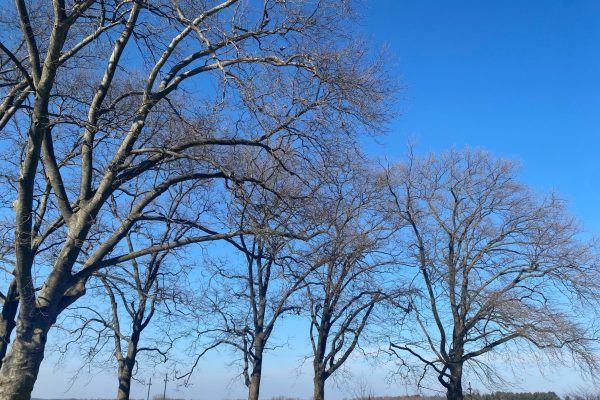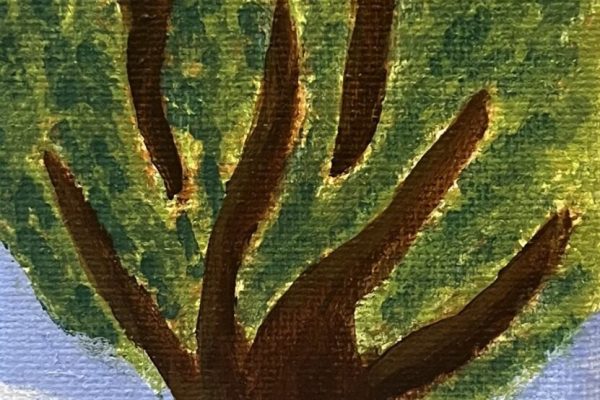ORDER OF THE TREE PLANTING CEREMONY
Welcome
Welcome to our tree planting! We plant a tree in our child’s honor and watch the child and the tree grow together. In this way we are able to celebrate life with life, to involve our children as well as ourselves, to cherish a living reminder of this new birth, and to mark its importance in our lives.
Custom of Tree Planting
In ancient Israel, a tree was planted when a child was born—a cedar for a boy, a cypress for a girl. As the children grew up, they cared for their own trees. When they were married, the bridegroom and bride stood under a canopy made of branches cut from the trees that had been planted in their honor years before. Thus, the Jewish tradition formed a strong bond between birth and marriage, and helped to develop a love for trees and a sensitivity to the wonders of nature.
Etz Hayyim (Tree of Life)
Our Torah is a Tree of Life to those that hold tight to it and everyone who upholds it is happy. Its ways are ways of pleasantness, and all its paths are peace (after Proverbs 3:17-18). The above may be sung in Hebrew, using tradtional or modern melodies.
Responsive Reading
“And God said: Let the earth put forth grass, herb yielding seed, and fruit trees bearing fruit after its kind … And it was so … And God saw that it was good.” (Genesis 1:11-12)
“When a tree is wantonly cut down, its voice rings from one end of the earth to another.” (Pirkei Derabbi Eliezer 43)
“When you besiege a city, do not destroy the trees thereof. You may eat of them but you must not cut them down.” (Deuteronomy 20:19)
“A person’s life is sustained by trees. Just as others planted for you, plant for the sake of your children.” (Midrash Tanchuma Kedoshim 8)
“If you had a sapling in your hand and were told that the Messiah had come, first plant the sapling, then go out to greet the Messiah.” (Midrash Avot Derabbi Natan 8,31)
“Build houses and dwell in them; plant gardens and eat the fruit of them.” (Jeremiah 29:5)
“You shall be like a tree planted beside a river; that brings forth its fruit in season, whose leaf does not wither; and whatsoever you do shall prosper.” (after Psalms 1:3)
“Zion shall no more be termed forsaken; neither shall the land be termed desolate any more.” (Isaiah 62:4)
“For the pastures of the wilderness are green with grass, the tree bears its fruit; the fig tree and the vine do yield their strength.” (Joel 2:22)
“Be glad, O land, and rejoice, for the Lord hath done great things.” (Joel 2:21)
The Story of the Planter
While walking along a road, a sage saw a man planting a carob tree. He asked him: “How long will it take for this tree to bear fruit?” “Seventy years,” replied the man. The sage then asked: “Are you so healthy a man that you expect to live that length of time and eat its fruit?” The man answered: “I found a fruitful world, because my ancestors planted it for me. Likewise I am planting for my children.” (Babylonian Talmud Ta’anit 23a)
Family Tree: The Story of the Name
This is the opportunity to share the heart and spirit of the person/people the child was named after. It is the child’s living history—the roots from which s/he will grow and the legacy s/he carries.
Siblings and Grandparents Welcome the New Baby and the Tree
Using poem, picture, or story, immediate and extended family offer words of welcome, blessing, and advice to the baby.
Our Prayer for Our Child and Her/His Tree
Dear God, we stand before you in awe as we witness these miracles of your creation—this young tree and our new baby. Both are unique and original, unlike anything that ever was before or will be. Each began with a single seed, concealing a complex potential that miraculously unfolds with each passing day.
We pray that the roots of this tree will gain hold and spread deep, drawing nourishment from the fertile earth. So may our child draw nourishment from her/his own roots—family, heritage and the Jewish tradition.
We pray that the trunk will grow healthy and strong, withstanding the harsh forces of nature and able to support its canopy of branches and leaves. So may our daughter/son possess a healthy body and a strong moral spirit, holding steadfast to his/her own integrity and withstanding the tempests and temptations that could weaken or deter her/him. We watch these branches bud and blossom, giving shade and beauty for all to enjoy. So, too, may we watch our child bud and blossom to be a blessing and support to family, friends and community, and to make his/her unique contribution to the world. Help us nourish and nurture this tree and our child so that they may both mature and prosper, fulfilling to the greatest extent possible the potential for which God placed them on earth.
Final Blessings and Planting
בָּרוּךְ אַתָּה אֲדֹנָי אֱלֹהֵינוּ מֶלֶךְ הָעוֹלָם עֹשֶׂה מַעֲשֶׂה בְּרֵאשִׁית
Barukh Atah Adonai Eloheinu Melekh Ha’olam oseh ma’aseh b’reshit.
בְּרוּכָה אַתְּ יָהּ אֱלֹהֵינוּ רוּחַ הָעוֹלָם עֹשֶׂה מַעֲשֶׂה בְּרֵאשִׁית
B’rukha At Yah Eloheinu Ruach Ha’olam osah ma’aseh b’reshit.
Blessed are You, Adonai our God, Ruler of the universe, who continually does the work of creation.
(Blessing recited upon seeing wonders of nature, including sunrises, shooting stars, vast deserts.)
בָּרוּךְ אַתָּה אֲדֹנָי אֱלֹהֵינוּ מֶלֶךְ הָעוֹלָם, שֶׁהֶחֱיָנוּ וְקִיְּמָנוּ וְהִגִּיעָנוּ לַזְּמָן הַזֶּה
Barukh Atah Adonai Eloheinu Melekh ha’olam, shehecheyanu, v’kimanu, v’higianu laz’man hazeh.
בְּרוּכָה אַתְּ יָהּ אֱלֹהֵינוּ רוּחַ הָעוֹלָם, שֶׁהֶחֱיָנוּ וְקִיְּמָנוּ וְהִגִּיעָנוּ לַזְּמָן
B’rukha At Yah Eoheinu Ruach ha’olam shehecheyanu v’kimanu v’higianu lazman hazeh.
Blessed Are You, Adonai, our God, Ruler of the Universe, who has kept us in life, and preserved us, and enabled us to reach this season.
(Blessing for reaching a new or momentous occasion.)
The tree is planted.
In Lifecycles: Jewish Women on Life Passages and Personal Milestones edited by Rabbi Debra Orenstein (Woodstock, VT; Jewish Lights, 1994), pp. 79-82. Used with permission of the author.











